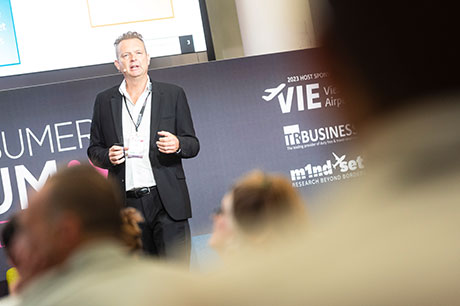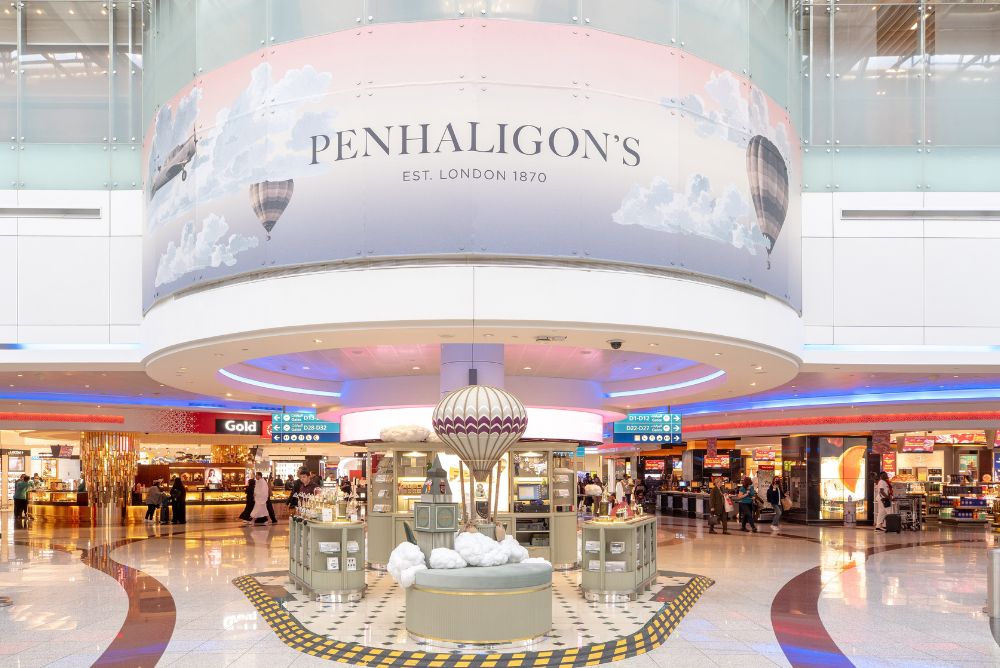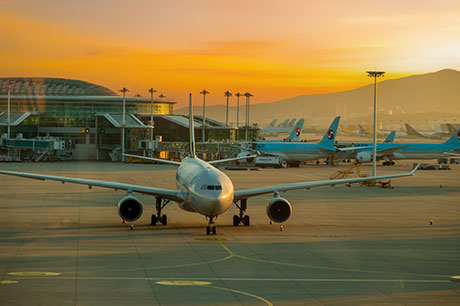Huge industry response to first TRConnect webinar
By Luke Barras-hill |
 TRBusiness has received a tidal wave of cross-industry support for the inaugural Travel Retail Connect (TRConnect) Covid-19 webinar, which aired today (5 May).
TRBusiness has received a tidal wave of cross-industry support for the inaugural Travel Retail Connect (TRConnect) Covid-19 webinar, which aired today (5 May).
The 75-minute session hosted at 14:00 CET attracted 899 registrations, with just over 500 permitted to watch live [to view a repeat of the webinar, click below].
Entitled, ‘Emerging Stronger in a Post-Covid World’, the first showing in TRBusiness’ series of incisive, thought-provoking webinars struck to the root of what is a multi-faceted topic and as viewers discovered, one with many converging opinions.
Hosted by TRBusiness Editorial Director Charlotte Turner and Events and CSR lead Michael Barrett, the webinar featured data-rich presentations and insightful commentary from Peter Mohn, CEO and Owner, m1nd-set and Anson Bailey, Head of Consumer & Retail, ASPAC, KPMG.
They accompanied a panel of leading travel retail executives: Lisa Bauer, President and CEO, Starboard Cruise Services; Sarah Branquinho, President, Duty Free World Council (DFWC); and Stewart Dryburgh, General Manager, Nestlé International Travel Retail.
BUSINESSES TO RE-ADJUST
Strong audience participation was a key feature of the webinar, with flash polls conducted at appropriate intervals designed to gauge reaction from the many industry stakeholders tuning in.
Collectively, the panellists and presenters unboxed strategies and solutions and discussed steps to prepare global DF&TR for an exit strategy from what is unquestionably the most severe crisis to have struck the industry.
After some opening remarks from Turner and Barrett, attention turned to exclusive m1nd-set research conducted among 1,500 international travellers around the world in the past six months passing through more than 60 different airports.
The research branched across 50 different nationalities and covered all regions of the world.
Among the findings, 89% claimed the coronavirus has changed living conditions and, as a result, 81% are more inclined to spend less in the near future.
Interestingly, 26% expressed a willingness to purchase different products and services in the near future, for example those that are local or more sustainable.

M1nd-set shared exclusive insights that illuminate clearly the sea change taking place in future shopping behaviours prompted by Covid-19. Click to enlarge.
From its origins as a mysterious pneumonia-type virus first discovered in Wuhan, China in December, Covid-19 has raged into a global pandemic.
The tragedy of lost lives have been flanked by a virtual shutdown in air and marine transport, with border closures, grounded flights and decimated economies and global equity markets.
While encouragingly, m1nd-set data reveals that 61% of travellers that had taken trips in the past 12 months would be willing to pick up air travel again within the first three months after lockdowns are lifted, for businesses the hit is likely to be particularly painful.

‘Emerging Stronger in a Post-Covid-19 World’. Clockwise from top left: Charlotte Turner, Editorial Director, TRBusiness; Michael Barrett, Events & CSR, TRBusiness; Sarah Branquinho, President, Duty Free World Council; Peter Mohn, Owner & CEO, m1nd-set; Lisa Bauer, President & CEO, Starboard Cruise Services; Stewart Dryburgh, General Manager, Nestlé International Travel Retail; and Anson Bailey, Head of Consumer & Retail ASPAC, KPMG.
Mohn acknowledged there are some differences in the data dependent on the region, for example in Asia where the situation is looking more positive.
A worrying 63% of business travellers claimed their companies would request a reduction in the number of business trips due to budget cuts, while 56% admitted that the precarious economic situation will result in fewer international trips.
Overall, 33% consider travelling less or not at all for business in the six months after travel bans are removed. For duty free purchasing, profound knock-on effects are expected.
According to m1nd-set, 41% of travellers stated they would visit duty free shops when international travel bans ease.
Of those who would choose not to visit duty free shops, 16% attributed it to Covid-19 directly. On a category level, perfumes, alcohol and skincare are the top three most impacted.
Delving deeper, 52% of respondents said they probably wouldn’t purchase any categories, while 35% stated they would consider opting for their preferred purchases.
However, perhaps more concerning is the suggestion that 65% of travellers will alter their behaviours in the airport environment after Covid-19 and 44% would spend less time shopping.
A resounding 91% flagged a desire to spend more time using their mobiles/tablets and laptops, 81% revealed they would avoid interacting with other passengers and 78% would try to isolate themselves from crowds.
Increased health and safety protocols will almost certainly become a mainstay for travel retailers for the foreseeable future and m1nd-set’s data points to that importance.
After Covid-19, 51% of travellers said they would refrain from unnecessarily touching products in duty free and 62% would refrain from being in proximity with retail ambassadors and sales staff.
“This will lead to new some new measures, information, signs and help from the sales staff to help passengers as they are worried about this aspect,” observed Mohn.
Asked whether travellers would prefer airline staff and fellow passengers to wear face masks, 62% said they would feel safer and reassured in the case of airline staff and 48% when it comes to other passengers.
The conclusion of Mohn’s presentation opened up the opportunity for the first TRBusiness flash poll of the webinar, a core component designed to enrich viewers’ engagement with the series.

A reported 85 million trips were made by domestic travellers in China in the three days beginning 1 May this year.
They were asked when they would likely resume international travel after travel restrictions are lifted, with 45% indicating a desire to do so within three months. A mere 10% expressed a preference to travel only if mandatory health screenings were in place at airports.
CHINA: TRAVEL CONFIDENCE RECALIBRATED?
Anson Bailey then made a compelling argument for the new retail ‘normal’ facing DF&TR. In a presentation aptly entitled, ‘Changing Consumer Behaviours in a Post-Covid-19 World’, Bailey extrapolated in detail how the emergence of new technology solutions into the retail sphere is driving discussion around change.
“I really think people are starting to discuss life after Covid-19; there is this new normal and I think we are going to see things happening at different speeds,” he said.
He mentioned that in the first three days of Golden Week beginning 1 May, 85 million domestic tourist trips were taken in China.
“Those numbers are quite significant and we are coming out of lockdown,” Bailey continued, although he forewarned of the mixed news emerging for air transport following US business tycoon Warren Buffett’s move to sell off $50 billion worth of shares in US airlines.
“This is time for a lot of companies to take stock; airlines and airports are really driving interesting new technology and innovation,” he explained. “There is an increasing focus on the customer, use of new tools such as machine learning, data and 5G.”
He outlined six drivers of consumption: Value, convenience, experience, choice, purpose, and privacy and safety, expanding on a discourse of accelerated retail changes taking place in Asia, including a pronounced move towards a cashless society through contactless mobile payments.
Business continuity, cashflow management, supply chain issues, changing consumer behaviours, wellness, health and hygiene and ecommerce are all fundamental trajectories.
However, despite the encouraging signs witnessed in China as alluded to above, Bailey struck a word of caution.
“China is not immune – 600,000 businesses are already closed with GDP and retail significantly down. There is light at the end of the tunnel, the lockdown has ended, but we’re not going to see travel overseas anytime in the immediate future.”
Regionally, Thailand, Russia and China had emerged as the favoured destinations for Chinese tourists in 2020.
On the other hand, the US has dropped out of a top ten list of favoured destinations entirely, in part due to trade tensions and Covid-19.
“Consumers are more digitally minded and tech-savvy than ever before,” declared Bailey. “Data, data, data is going to power growth. That is the new gold.”
Much of that growth is being fuelled by China’s flourishing digital and social media platforms, said Bailey, with 1.2 billion Alipay users, one billion on WeChat and 765 million mobile payment users.
“Those numbers are staggering and continuing to grow,” added Bailey. “This is the new normal. We are seeing the changing ownership from the ownership of assets to the ownership of access and this is something we need to be thinking about.”
Taobao, JD.com, Amazon, Facebook and Tmall offer instant delivery, transparent pricing and flexible payments, added Bailey. “Traditional players in travel retail have to up their game.”
Heady investment in what Bailey describes as ‘new economy companies’, capitalising on social media platforms and influencer marketing (KOLs, microbloggers) and the leap from cash to digital payments are transforming retail’s landscape.
“The major hiccup I see is around fulfilment and logistics infrastructure,” he continued. “Be ready for emerging technology like AI and blockchain: It will impact our supply chains.”
 A discussion then ensued, offering a vibrant cross-exchange of ideas that unboxed some of the major talking points from the presentations.
A discussion then ensued, offering a vibrant cross-exchange of ideas that unboxed some of the major talking points from the presentations.
Dovetailing with yesterday’s announcement of a framework protocol galvanising support from retailers and suppliers to aid the DF&TR recovery in the face of Covid-19, Sarah Branquinho, DFWC reiterated that the priority remains on increasing share of voice for the industry.
“As an industry we know we tend to fall between two stalls – not the aviation or maritime sector, we’re somewhere buried in them, yet we are a vital component of all of those.
“The various regional associations and the world council itself have been reaching out recently to governments and in some cases airports and cruise lines to make sure we don’t fall between the cracks.”
She reiterated that industry associations have been connecting with governments to push the message of DF&TR’s significant contribution to economies across the globe.
FIERCE PACE OF CHANGE
Addressing Mohn’s research, Starboard’s Lisa Bauer highlighted that the 61% of passengers ready to travel again aligns closely with behaviours exhibited in the cruise sector.
“Those first-time cruisers or those considering a cruise… the size of that market has shrunk, but just like in the air we see the travellers coming back are the loyalists and those that have cruised before,” she said.
Bauer went on to stress the importance of customer centricity and allowing guests to engage with retail in their own way.
“The role of digital is incredible, so whether it is pre-cruise, integration with the cruise lines through individual apps so customers can transact on their phones, click and collect, set up appointments for personalised shopping, but also having a safe experience for those wanting to come into the stores and having experiences – from our perspective it is really omnichannel, letting the customer transact in a way they feel comfortable.
“From a cruise perspective, the cruise lines have always had a focus on safety and that will be even more prevalent moving forward and anything we can do to inspire confidence will be really important.”

Viewers were offered the chance to ask questions via a live feed, with a selection of the most popular questions put to panellists and speakers.
Nestlé ITR’s Stewart Dryburgh reinforced a prevailing view that good data and reference points are imperative for the industry to navigate the turbulent status quo.
He asked viewers to bear two points in mind: Travel will be influenced as much by the desire of travellers to do so, as their financial capabilities.
“Part of that is confidence is the health scenario and that will be allayed by [the discovery of] a vaccine,” he said. “That will have a sustainable effect on economic life generally which will stimulate economies globally.
“This moment in time we are living through is creating a disconnect which is creating a shift in the way people use digital,” Dryburgh continued, stressing the duality of offering value and meeting needs as central to customers’ demands.
In a second flash poll concerning the key to driving traffic into shops in the post-Covid-19 era, 69% believed in reassuring passengers of health and safety measures, while 38% mentioned attractive promotions and travel retail exclusives.
Following some interesting discussion on the role of KOLs and influencers and the attention to (or lack of) data harvesting, a central message that surfaced surrounded the perpetual pace of change.
“Zoom had 10 million daily active users on 1 December, as of last week they had 300m daily active users,” explained Bailey. “With the technology here now that we can set up all these calls and online meetings and with a lot more cost pressures, I think a lot of smart companies will be deploying a lot more technology in the future.”
In an audience Q&A, panellists and speakers tackled a range of questions, including the potential to increase duty free allowances to boost sales, supplier and retailer dynamics, payments, changes in methods of merchandising and selling vis-a-vis sales staff.
“The data Peter shared sends a very clear signal to all of us that some of the actions we are going to need to take will be completely counter cultural to what we’ve done in the past,” commented Dryburgh.
“In the past, it’s been about getting in front of the consumer with whisky, chocolate etc and right now the thing we need to do is back off and leave people space so they feel comfortable. In the short term one of the things we will have to do is create space for people and looking at things through a completely different lens.”
Concurring with Dryburgh, Starboard’s Bauer added that support from parent firm LVMH in the form of a taskforce has helped Starboard shape the future of the customer experience and re-think the entire customer journey.
Another question raised by several viewers was whether the associations would push for financial support to siphon down to those suppliers at risk of becoming insolvent as a result of Covid-19.

‘Duty Free Care for Carers’ invites all DF&TR stakeholders to give generously to the health and medical professionals leading the valiant fight against Covid-19.
DUTY FREE FOR CARERS LAUNCHES
In an important conclusion to the Covid-19 webinar, TRBusiness unveiled the ‘Duty Free Care for Carers’ campaign.
This offers important benefits and discounts at travel retail shops and F&B outlets to global frontline health workers when they travel internationally.
Giveaways and promotions such as a cup of coffee or tickets to enter high-value prize draws are also included in the mix.
All frontline staff including doctors, nurses and other hospital employees, plus carers in homes for the elderly, are included among the beneficiaries.
Pledges offered by stakeholders will be listed on the dedicated ‘Duty Free Care for Carers’ campaign page on TRBusiness.com with a link to information (including any special terms and conditions) on the pledger’s own website or Facebook page.
To download the m1nd-set presentation by Peter Mohn, click here.
To download the KPMG presentation by Anson Bailey, click here.
Stay close to TRBusiness for further information on the next TRConnect webinar.
Alcohol insights: Conversion up, spend down in Q4
Conversion of visitors in the alcohol category in duty free has risen to 54% in Q4 2023,...
Men buy and spend more in travel retail says new research by m1nd-set
Men have a higher conversion rate and spend more when shopping in travel retail, says new...
Saudia Arabia's KKIA unfurls T3 duty free expansion
King Khalid International Airport (KKIA) has unveiled the first stage of its much-vaunted duty...
-
 International,
International,Alcohol insights: Conversion up, spend down in Q4
-

-
 International,
International,Saudia Arabia's KKIA unfurls T3 duty free expansion

In the Magazine
TRBusiness Magazine is free to access. Read the latest issue now.

 Trbusiness. The travel retail Trbusiness. The magazine for global retail and duty free professionals.
Trbusiness. The travel retail Trbusiness. The magazine for global retail and duty free professionals.

























